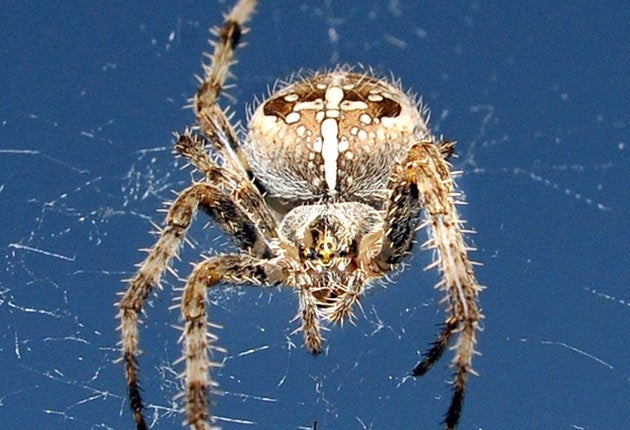A soggy summer means we are in for a spider invasion
Bug bonanza has given UK's many species a boost. By Tom Peck

First came the rains, now the arachnids. The last rays of wetter than normal summer have gone, the spiders are coming in from the cold, and after months of exponential breeding, a natural consequence of a damp summer, there will be a far higher number than in previous years.
Already a terrified Coventry woman has dialled 999 this week after finding an extraordinarily large spider in her kitchen. The woman demanded a policeman be sent to remove the creature, but was was politely reminded the number was for emergencies only.
A cool, wet summer boosts insect numbers, so there are plenty for the spiders to eat. "A lot of bugs do really well in moist conditions, so that's food for spiders, which might mean it's a banner year for spiders," said Jacob Borg, head of Pointe Pest Control.
Thousands of spiders and daddy long-legs move into homes as winter approaches, although some live indoors all year round. But it is this time of year when they have grown bigger, and the males search for a mate. Their presence is not without its benefits. "A house spider can eat 20 flies a year. They control the populations of other insects, and themselves provide food for a host of other wildlife," said Matt Shardlow, head of insect charity Buglife.
The UK's increasingly mild climate over the last few years has seen the number of spider species in the UK rise significantly. Foreign arachnids have long arrived with imports of food and plants, but only recently have they been able to survive and spread.
The new inhabitants include a species of false widow spider, a relation of the deadly black widow, prompting calls for stricter controls on the imports of bio-material.
If the wet weather continues, as is forecast, it will create favourable breeding conditions for the arachnids, who are now in mating season. Larvae will have an abundance of decaying plant matter to eat, leading to another increase next autumn.
The oft-quoted fact that all spiders native to the UK are venomous is, surprisingly, true. Without venom they could not disable and digest their prey, but most are harmless to humans – their fangs can't penetrate our skin.
Only 14 of an estimated 600 spider species in Britain are able to bite, and most are no worse than a bee sting. Although bites from two species, the walnut orb weaver and a type of false widow, Steatoda nobilis, can cause burning sensations and swelling, followed by pulsating pain and sickness.
The House Spider is the UK's most abundant spider. Female house spiders are 9-10mm in size, and males are 6-9mm. They feed on insects such as beetles, earwigs and cockroaches. House spiders have even been observed eating earthworms. They can survive for months without food or water. Among the rarest is the ladybird spider. Previously thought to be extinct a number have recently been reintroduced in Dorset.
Join our commenting forum
Join thought-provoking conversations, follow other Independent readers and see their replies
Comments
Bookmark popover
Removed from bookmarks